39 products
- Red Wine
- Nebbiolo
- Organic, Vegan-Friendly
- Dry
- 750ml
- 14% alc./vol
About the Winery
Réva
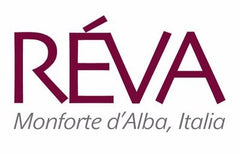
Réva is a winery based in Monforte D’Alba, within the Langhe area, in Piedmont, west northern Italy. Its aim is to bring the most brilliant young people of the area together, entrusting them with the task of expressing themselves in the most creative and professional way possible. This is Réva’s Wave, a dynamic team that represents the new Langhe generation, in constant communication with tradition, without the fear of reinterpreting it.
Today the vineyard sites which spread over 4 villages, Monforte D’Alba, Serralunga D’Alba, Novello and Barolo are all managed directly with the entire agronomic work done manually. Strong sustainable vineyards conduction, certified organic, they believe that their biggest challenge is not inventing anything but just define and express the beauty of the land where they live.
Behind every glass of wine there is an expression, expression of terroir, varietal, the varietal is for them everything, indigenous, they speak of the land and, last but not least, passion for what they do. Simply as that.
Press Reviews
Wine Align
92 points - Michael Godel
Not just amazing but actual, verifiable and absolute truth spoken by way of transparent and clemently honest nebbiolo. Reddest of the cherry red varietal wines, not Barolo because it’s almost too perfectly what it purports to be, without aggression, grip or grandeur. If anyone should find austerity in the tannins or any part of this nebbiolo then something is amiss. For pure drinking pleasure with the grape’s natural acidity in full tact and attack, look no further than this rosy beauty by Réva. Drink 2022-2025. Tasted May 2022.
- Red Wine
- Dry
- Medium Bodied
- 750ml
- 14% alc./vol
Press Reviews
Wine Align
91 points - Sara d'Amato
A biodynamically-grown blend of grenache (40%), syrah (30%) and mourvèdre (30%) from the schist soils of the hilly, coastal appellation of Faugères. A low-interventionist style fermented spontaneously with 10 months of maturation in stainless steel vats and neutral oak. Clean and juicy with lively red fruit and hints of peppercorn, anise, pine needles, and juniper. Silky tannins and some warmth on the finish point to a riper vintage. Notably complex but effortlessly drinkable. Very good length.Tasted in magnum at Terroirs & Millésimes 2024.
- Red Wine
- Sangiovese
- Organic, Vegan-Friendly
- Dry
- Medium Bodied
- 750ml
- 14% alc./vol
About the Winery
Villa Calcinaia
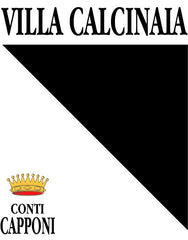
Villa Calcinaia is situated in the centre of Chianti Classico near the town of Greve-in-Chianti. This historic estate has been home to the Counts Capponi since 1524, and is maintained by Sebastiano Capponi and his brother Niccolo. In 1992, Count Sebastiano Capponi became the first in the history of the family to manage the winery personally, giving a new life to the vineyards and the cellar.
The family owns 200 hectares of land planted with olive trees, vines and pine trees. Organic farming is the standard at Villa Calcinaia where 75 acres of vineyard are planted with Sangiovese, Merlot, Canaiolo, Grechetto, Vernaccia, Trebbiano, and Malvasia. Through every vintage, the wines are crafted with food in mind. They are balanced, elegant, perfumed, and savoury yet refreshing with restrained vigour and intensity that ensures longevity.
Press Reviews
Wine Align
92 points - Michael Godel
2019: As a reminder Cappone (the singular) is sangiovese from the youngest vines on winemaker/proprietor/philosopher Sebastiano Capponi’s Villa Calcinaia estate in Greve in Chianti. Capponi also makes a Chianti Classico (Annata) from more mature plants yet truth be told the consistency in his wines from sku to sku and vintage to vintage is just about as exemplary as it gets for the region. The 2019 captures all the qualities of Calcinaia’s terroir and style with near pitch perfection, in as much as a $25 wine can effect. Phenolic ripeness at peak, acids salty and crunchy, tannins real, sapid and secure. Drink 2022-2025. Tasted October 2022.
91 points - David Lawrason
2019: This is a quite ripe, fruity and floral expression of young Chianti with pretty raspberry/currant fruit nicely inflected with fresh herbs and a certain charcuteries meatiness. It is medium bodied, well balanced, fresh with some tannic grit, but nothing that hearty. The length is very good. Best 2023 to 2026. Tasted October 2022
- Red Wine
- Sangiovese
- Organic, Vegan-Friendly
- Dry
- Medium Bodied
- 750ml
- 13% alc./vol
About the Winery
Villa Calcinaia

Villa Calcinaia is situated in the centre of Chianti Classico near the town of Greve-in-Chianti. This historic estate has been home to the Counts Capponi since 1524, and is maintained by Sebastiano Capponi and his brother Niccolo. In 1992, Count Sebastiano Capponi became the first in the history of the family to manage the winery personally, giving a new life to the vineyards and the cellar.
The family owns 200 hectares of land planted with olive trees, vines and pine trees. Organic farming is the standard at Villa Calcinaia where 75 acres of vineyard are planted with Sangiovese, Merlot, Canaiolo, Grechetto, Vernaccia, Trebbiano, and Malvasia. Through every vintage, the wines are crafted with food in mind. They are balanced, elegant, perfumed, and savoury yet refreshing with restrained vigour and intensity that ensures longevity.
Press Reviews
Wine Align
91 points - Michael Godel
The continuing education for a Calcinaia Chianti Classico at the border of two UGAs (Greve and Montefioralle) makes for a pertinent learning experience. Does this lean one way or the other and the answer would be yes because Il Conte’s reeks of the Montefioralle hills and brush scapes. With the dissipation of zest there is a rise in savour that speaks of the smaller UGA within the larger commune of Greve. Learning about sangiovese origins in Chianti Classico is fun, especially when threads are noticed in the commonalities between wines. Last tasted April 2023.
Fine and far from presumptuous Annata here from Il Conte, exemplary of a Greve, digging a bit deeper into Montefioralle sangiovese. Firm of dark and even dusty fruit, antsy and a bit racy while still this youthful, unsettled and needing time. Firm and grippy for the vintage, absolutely Calcinaia in style and a true representation of the multifarious estate soils. Drink 2024-2027. Tasted February 2022.
91 points - Megha Jandhyala
This is an aromatically vibrant chianti classico, with intriguing flavours of dried leaves, underbrush, and cherries, alongside subtle, pleasing notes of spice and violets. The palate is an engaging interplay of herbs and supple red fruit, supported by fine tannins and firm, tart acids. The finish is long-lasting and consistent. Tasted April 2023 by Critic Understudy Megha Jandhyala.
90 points - David Lawrason
This is a classic, lively, intense Chianti. The nose is lifted with redcurrant/cherry, fresh herbs, spice and a meaty/charcuterie note from some H2S. It is medium bodied, juicy, tart-edged with very good flavour intensity. Tannins are quite fine, the length is very good to excellent. Tasted April 2023.
- White Wine
- Garnacha Blanca
- Natural, Sustainable, Vegan-Friendly
- Dry
- Medium Bodied
- 750ml
- 14.2% alc./vol
About the Winery
Bodegas Puiggros

Since 1843, the Puiggros family has been producing wines from their own vines in the Odena region of Catalunya for the family and close friends. Over generations they had come to realize that their vineyards and techniques were something worth sharing with the world. A sincere dedication to the terroir in their zone and the indigenous varieties that grow there, allows them to constantly discover ways to unlock all of the magic that lies within their land.
Starting with conscious and clean farming in the vineyard, they hand-harvest only the best fruit for their production, and ferment each vineyard separately in varying vessels to accentuate what the vines have to show; some in stainless steel, and many in clay amphora of differing sizes. All the while seeing very little sulfur use (if any) until bottling. Puiggros is pushing the quality of northeastern Spain's wines forward, and doing so in a clean and unique way.
Bodegas Puiggròs
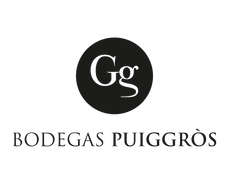
Since 1843, the Puiggros family has been producing wines from their own vines in the Odena region of Catalunya for the family and close friends. Over generations they had come to realize that their vineyards and techniques were something worth sharing with the world. A sincere dedication to the terroir in their zone and the indigenous varieties that grow there, allows them to constantly discover ways to unlock all of the magic that lies within their land.
Starting with conscious and clean farming in the vineyard, they hand-harvest only the best fruit for their production, and ferment each vineyard separately in varying vessels to accentuate what the vines have to show; some in stainless steel, and many in clay amphora of differing sizes. All the while seeing very little sulfur use (if any) until bottling. Puiggros is pushing the quality of northeastern Spain's wines forward, and doing so in a clean and unique way.
Press Reviews
Wine Align
91 points (2020) - Michael Godel
In Catalunya and other parts of Spain’s north-central appellations there has been a decade-long investigation into grenache raised in amphora with Bodegas Puiggròs making some of the cleanest of the bunch. This family’s work dates back nearly 180 years though in bottling just more than a dozen. Their Catalonian garnatxa blanca grown at 600m on limestone and clay sees time in 800L clay amphora. The freshness and oily texture combine for honest to goodness pleasure with lemon, orange, lime and dried herbs all in the mix. Almost lemongrass and kefir but certainly some notes of exoticism within. Good energy here and worth a look, finishing with tell-tale tisane and tonic. Drink 2022-2025. Tasted September 2022.
91 points (2020) - John Szabo, MS
Amphora-aged garnacha blanca from Catalonia, Puiggros's 2020 Exedra is a fine follow up to the excellent 2019, clean, fresher than most in the clay pot-aged genre. I like the gentle white-fleshed orchard fruit flavours, the lemon curd and cream, the fullish, well-rounded palate, the impressive length. It's not easy to render this style so cleanly and precisely, but Puiggros does it so well. I'd consider ageing it another year or two for full complexity, though it's also admittedly delicious now. Tasted September 2022.
89 points (2020) - David Lawrason
This is 100% grenache blanc - the favoured white grape of northeast Spain. It shows bright fairly deep lemon colour. The nose is generous but gentle with ripe yellow melon/pear fruit, acacia florality, a hint of anise and spice. It is medium-full bodied, just off-dry and sour-edged with a hint of acetic, which lowers my rating below 90. Still, it is enjoyable, quite plush, open knit and intensely flavoured with excellent length. Tasted Sept 2022
- White Wine
- Grüner Veltliner
- Biodynamic, Organic
- Dry
- 750ml
- 11.5% alc./vol
About the Winery
Matthias Hager
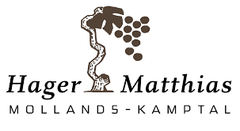
The Hager Matthias winery is located in the small village of Mollands in the Kamptal area of Lower Austria. Matthias took over the 12-hectare land and the family business at an early age. He aims to produce the best quality wine possible and to focus on being in balance with nature. The lands are cultivated according to biodynamic principles and are certified Demeter. Matthias has a vast knowledge about plants and insects, and about keeping the flora and fauna in harmony with the vines. Matthias Hager is one of the most experimental winemakers in the Kamptal region, Austria. He understood early how to work with different soil types from loess to clay. He established different product lines to highlight these differences: the blue one representing fresh, lively wines including Grüner Veltliner and Sauvignon Blanc; and the brown line gravitating towards more earthy, flavourful produce and the red line stands for no sulphites!
Press Reviews
Wine Align
92 points - Michael Godel
Juicy and extremely forthright for grüner veltliner with aromatic volume, a push of buzz, kinetic energy and acidity, finishing on a string with strong mocker flavours. Nothing subtle or understated here but more so a signature Austrian white that states its business, claims its territory and delivers waves of toothsome varietal style. Stands up to be noticed, and counted! Drink 2024-2027. Tasted October 2024.
91 points - David Lawrason
This is quite stylish, leaner and elegant - not as forward as many. There is also a more leesy note, with less obvious fruit. The honeyed, bready and peach notes remind me of pinot gris. It is light to medium bodied, quite firm, linear and very long on the finish. Some minerality here. Tasted October 2024
91 points - John Szabo, MS
Demeter-certified biodynamic, open and lively, energetic and vibrant, this is indeed one of the more lively grüner veltliners from the '23 vintage that I've tasted so far, also clean but with lees flavour lingering, supressing the exuberant citrus fruit. I love the balanced-crunchy acids and the high intensity and density flavours. Long, open and honest finish. Well done I have to say, ready to enjoy, but no rush. Tasted October 2024.
- Red Wine, White Wine
- Cabernet Franc, Chenin Blanc
- Organic, Vegan-Friendly
- Dry
- Full Bodied
- 750ml
- 13.50% alc./vol
About the Winery
Château de Parnay

Château de Parnay is the flagship of the AOC Saumur Champigny. The property is located along the Loire river, classified as UNESCO World Heritage, on the most reputable clay and limestone terroirs of the appellation. The historic property was taken over by Mathias Levron & Régis Vincenot in 2006 with the aim of restoring the nobility of this special place.
Drawing their strength from the authenticity of their values, they now cultivate 50 hectares of vines with the aim of producing exceptional wines in a way that respects the environment. They have been certified organic since 2013 and are about to be certified biodynamic too.
The Clos of Chemin des Murs is the jewel of the property! Coming from the imagination of it's orginal owner, Antoine Cristal, this Clos was built, planted and cultivated according to an unprecedented technique. On this half hectare of Chenin Blanc, each vine was planted on the north face of a stone wall. Through a hole in the stone the vine crosses through the wall and allowing the grapes to grow facing the southern sunshine. The vine is said to have its 'foot in the cool and belly in the sun'.
Press Reviews
Wine Align
94 points - John Szabo
Château de Parnay Chemin des Murs Saumur Blanc 2019.
This leads with a terrific nose very much in the varietal/regional idiom, honeyed, floral, apple and lemon zest-scented, complex and exotic, not to mention stony. The palate displays a similar level of poise and composure, cool, transparent yet with a heavy freight of flavour , and terrific length. This is really quite extraordinary wine, delicious now, but surely capable of a decade or so in the cellar. Top notch. Tasted March 2019.
93 points - Michael Godel
Château de Parnay Chemin des Murs Saumur Blanc 2019.
The rare and elusive 100 per cent chenin blanc from Samur makes full use of clay-calcaire-tuffeau soils for this dry and piqued white wine. So crunchy and expressive with an expansive character that fills the mouth by making contact withy every nerve and pour. Benchmark and controlled explosive example, rare or otherwise. Drink 2020-2025. Tasted March 2020.
91 points - David Lawrason
Château de Parnay Chemin des Murs Saumur Blanc 2019.
It is rare to come across fine Saumur chenin, a central Loire Valley appellation overshadowed by Vouvray. This is mid-weight, dry and quite firm classic with a fairly generous nose of pear, spice, vague fresh herbs and wet stone. It becomes quite dry and somewhat grapefruity bitter on the finish, trailing solid minerality as well. Very good to excellent length. Tasted March 2020.
- White Wine
- Inzolia
- Dry
- 750ml
- 12.50% alc./vol
About the Winery
Cantine Barbera
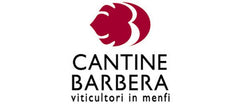
Cantina Barbera is located in the Menfi Coast, on the west coast of Sicily. The vineyards are about one mile from the Mediterranean Sea: an uncontaminated deep blue sea, facing South, where low cliffs and sandy dunes create a beautiful environment protected by the Belice River Natural Reservation Fund.
A third generation farmer, Marilena Barbera farms the Inzolia that her grandfather planted in the 20's, just as she attends to the native varietals that are the new frontier of her own generation: Perricone, Nerello, Alicante, Nero d'Avola and Grillo. Marilena makes her wines praticticing organic farming and natural winemaking, while paying utmost respect to Menfi's terroir.
"At the winery, I chose to work only with spontaneous fermentations and to adopt non invasive winemaking practices, in order to respect the unique personality of Sicilian native grape varieties and the beautiful land to which they belong."
- Red Wine
- Nebbiolo
- Organic, Vegan-Friendly
- Dry
- 750ml
- 14% alc./vol
- White Wine
- Sylvaner
- Biodynamic, Organic, Vegan-Friendly
- Dry
- Light Bodied
- 750ml
- 12.5% alc./vol
About the Winery
Domaine Muré
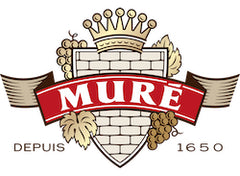
The Muré family has been winegrowers in the region of Rouffach since 1650. In 1935, Alfred Muré, René’s grandfather, bought 32 acres of family-monopole vineyard name Clos St. Landelin, an area that has been described as the best of Alsace Grand Cru since the 7th Century.
Today, René Muré, the 11th generation of the family, along with his children, Véronique and Thomas, are responsible for running their exceptional Grand Cru vineyard and neighbouring terroirs using biodynamic methods. Until this day, they persist in hand-picking every single grape, and focus on crafting wines that preserve the family’s credo. The resulting wines are some of Alsace's finest – powerful, elegant, and age-worthy.
- Red Wine, White Wine
- Cinsault, Clairette, Grenache, Grenache Blanc, Marsanne, Picpoul, Syrah
- Organic, Vegan-Friendly
- Dry
- Full Bodied
- 750ml
- 13.50% alc./vol
About the Winery
Château de Montfaucon

Just across the Rhone river from the beautiful vineyards of Chateauneuf-du-Pape, the Lirac appellation extends itself on the low hills alongside the river. The history of Château de Montfaucon dates back to the 11th century when the castle's first tower was built. The castle's role in history was strategic; the Rhône River was the border between the French Kingdom and the Holy Roman German Empire. Montfaucon was one of many castles and fortresses along the Rhône River constructed to guard the border.
Rodolphe de Pins took over the family estate of Montfaucon in 1995 and subsequently rebuilt the winery and began practicing sustainable agriculture. He honed his winemaking skills in Barossa at Henschke and Vieux Telegraphe in Châteauneuf du Pape before returning to Lirac, so needless to say, his familiarity with the local varieties is well established.












